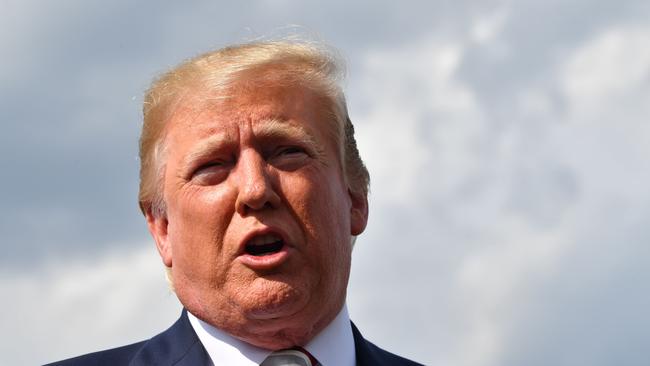
Furious at Donald Trump’s threat last week to impose 10 per cent tariffs on the remaining $US300 billion ($440bn) worth of Chinese exports to the US, starting on September 1, China’s Ministry of Commerce announced last Friday that it was prepared to launch retaliatory action.
“The Chinese side will not give in to any extreme pressure, intimidation or blackmail and we will never concede an inch on major issues of principle,” said Chinese Foreign Ministry spokeswoman Hua Chunying on Friday after Trump’s tweet.
Yesterday saw the beginning of a new attitude in Beijing, where its central bank was no longer prepared to defend the critical seven yuan/$US level, allowing its currency to fall, which will help offset the cost of the higher tariffs.
“The weak fixing is the first sign that Chinese authorities are now finally willing to adopt a hands-off approach and allow the exchange rate to be market determined,” said ANZ’s head of Asia research, Khoon Goh.
“After numerous attempts in recent years to prevent the yuan from weakening past the seven level, they have decided to let it go.”
But he added that “it is unclear to us how much currency weakness the authorities are willing to tolerate”.
Despite Western rhetoric about “weaponising” its currency, Chinese leaders far prefer stability over sharp market swings for their own domestic confidence purposes.
They will also not want to allow too much unnecessary uncertainty on Asian currency markets.
But yesterday’s move shows Beijing feels the need to show Washington that it too can take the gloves off in the trade war.
As China only buys around $US120bn worth of goods from the US each year, compared with the US buying $US550bn from China, Beijing’s ability to retaliate on a like for like basis with Trump’s threatened tariffs is limited.
But, as the US will now learn, Beijing has more weapons in its policy armoury.
There were increasing reports yesterday that the Chinese government had asked its state-owned enterprises to suspend their US agricultural imports, as they wait to see what will be Trump’s next move on the trade talks.
China has been America’s largest customer for soybeans, which it crushes to make pig feed.
But imports have already dropped to the lowest levels since 2004 as China imposed a 25 per cent tariff on soybeans last year in retaliation for Trump’s tariffs.
Trump has repeatedly claimed that China has not been making extra purchases of soybeans as he had hoped, but China is now seeing this as a way to hit Trump’s standing in the US farm belt, opting to buy soybeans from Brazil.
As a sign of goodwill, China had recently given the go ahead for five companies to buy up to three million tonnes of US soybeans without paying the penalty 25 per cent tariffs.
But now it appears that, following Trump’s aggressive tweet of last Thursday threatening new tariffs, all bets are now off if Trump goes ahead with them.
With China such a big market for some major US companies, from Boeing to GE to Apple and Starbucks, Beijing has many other retaliatory options.
In May, Beijing announced it was drawing up a list of “unreliable” foreign entities — companies that it might target for their trade practices in China.
The list sent shockwaves through the US business community in China.
Delivery company Fed Ex, which invested $US100m in building a new facility in Shanghai, found itself under an investigation in China over its handling of the delivery of packages meant for telecoms company Huawei which has been criticised by Trump.
US companies are also afraid of other forms of retaliation such as slower customs clearances, more inspections and delayed approvals for licences.
Australia has already felt the impact of delayed customs process procedures in its coal exports to China, with coal ships held up for as much as 50 days at Chinese ports since February while Canadian canola oil has found itself under closer scrutiny from quarantine inspectors.
Other retaliatory action could include cancelling orders for planes from Boeing and Chinese customers taking the nationalistic approach, opting to buy Chinese-made smart phones, for example, over those made by Apple.
As Donald Trump may find out soon, if he is looking for a fight over trade rather than negotiating a trade deal in good faith, Beijing will be well and truly prepared to give him one.




China’s move yesterday to let its currency fall below the seven yuan to the US dollar level is the first of many weapons Beijing can use as the bitter trade war of the past year escalates to a more serious clash.